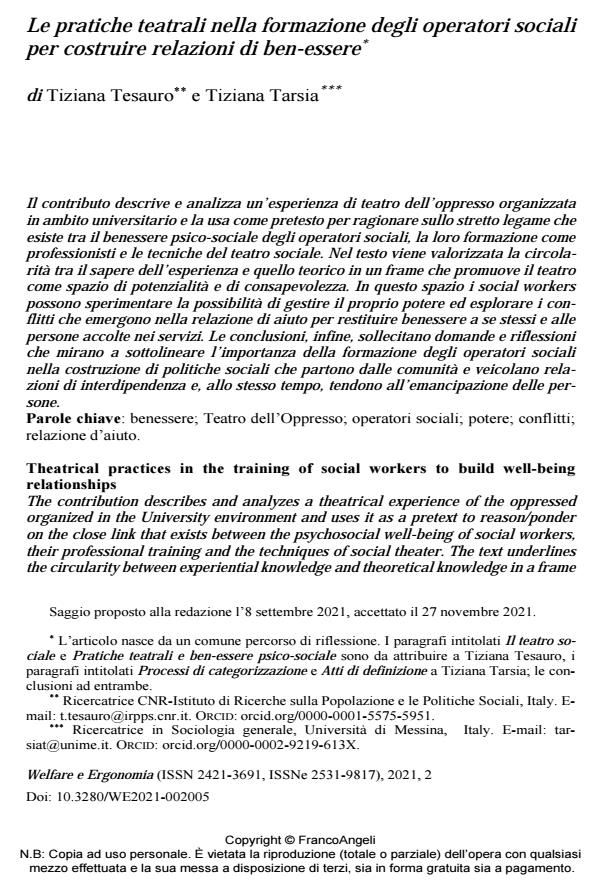Theatrical practices in the training of social workers to build well-being relationships
Journal title WELFARE E ERGONOMIA
Author/s Tiziana Tesauro, Tiziana Tarsia
Publishing Year 2022 Issue 2021/2
Language Italian Pages 12 P. 65-76 File size 237 KB
DOI 10.3280/WE2021-002005
DOI is like a bar code for intellectual property: to have more infomation
click here
Below, you can see the article first page
If you want to buy this article in PDF format, you can do it, following the instructions to buy download credits

FrancoAngeli is member of Publishers International Linking Association, Inc (PILA), a not-for-profit association which run the CrossRef service enabling links to and from online scholarly content.
The contribution describes and analyzes a theatrical experience of the oppressed organized in the University environment and uses it as a pretext to reason/ponder on the close link that exists between the psychosocial well-being of social workers, their professional training and the techniques of social theater. The text underlines the circularity between experiential knowledge and theoretical knowledge in a frame that promotes theater as a space of potential and awareness. In this space, social workers can experience the possibility of managing their power and exploring the conflicts that emerge in the helping relationship to restore well-being to themselves and to the people received in the services. Finally, the conclusions solicit questions and reflections that aim to underline the importance of training social workers in the construction of social policies that start from communities and transmit relationships of interdependence and, at the same time, aim at the emancipation of use.
Keywords: well-being; theater of the oppressed; social workers; power; conflict; helping relationship.
- Ashcroft R. e Katwyk T. (2016). Joing the Global Conversation: Social Workers Define Health Using a Partecipatory Action Research Approach. British journal of social work. 47: 579-596. DOI: 10.1093/BJSW/BCW005
- Bateson G. (1972). Steps to an Ecology of Mind. London: Jason Aronson Inc. (trad. it. Verso l’ecologia della mente. Milano: Adelphi, 1977).
- Becker H.S. (2007). I trucchi del mestiere. Come fare ricerca sociale. Bologna: il Mulino.
- Bernardi C. e Innocenti Malini G. (2020). Il teatro sociale tra rappresentazione, relazione e azione. La Salute umana, 278: 25-26.
- Boal A. (2011). L’estetica dell’oppresso. L’arte e l’estetica come strumenti di libertà. Molfetta (Ba): La Meridiana.
- Boal A. (2009). Il poliziotto e la maschera. Giochi, esercizi e tecniche del Teatro dell’Oppresso. Molfetta (Ba): La Meridiana.
- Bruner J. (1986). Actual Minds, Possible Worlds. Cambridge: MA, Harvard University Press (trad. it: La mente a più dimensioni. Roma-Bari: Laterza, 1988).
- Busso S., Meo A. e Morlicchio E. (2018). Il buono, il brutto e il cattivo. Rappresentazioni e forme di ‘regolazione dei poveri’ nelle misure di sostegno al reddito. Sinappsi, 3: 69-83.
- Donati P. (2013). Sociologia della relazione. Bologna: il Mulino.
- Dubois V. (2018). Il burocrate e il povero. Sesto San Giovanni (Mi): Mimesis.
- Folgheraiter F. (2007). La logica sociale dell’aiuto Fondamenti per una teoria relazionale del welfare. Trento: Erickson.
- Freire P. (2011). La pedagogia degli oppressi. Torino: EGA.
- Freire P. (2004). Pedagogia dell'autonomia. Saperi necessari per la pratica educativa. Torino: Erga.
- Galtung J. (2010). Affrontare il conflitto. Trascendere e trasformare. Pisa: Pisa University Press.
- Goffman E. (2012). Stigma. L’identità negata. Verona: Ombrecorte.
- Goffman E. (2006). Frame analysis. L’organizzazione dell’esperienza. Roma: Armando.
- Goffman E. (2003). Espressione e identità. Gioco, ruoli, teatralità. Bologna: il Mulino.
- Goleman D. (1996). Emotional Intelligence. London: Bloomsbury (trad. it: Intelligenza emotiva. Milano: RCS Libri, 1997).
- Grotowski J. (1970). Per un teatro povero. Roma: Bulzoni.
- Krumer-Nevo M. (2021). Speranza radicale. Lavoro sociale e povertà. Trento: Erickson.
- Laverack G. (2018). Salute Pubblica. Potere, empowerment e pratica professionale. Roma: Il Pensiero Scientifico
- Mannheim K. (1952). Essay on the Sociology of Knowledge. London: Routledge&Kegan Paul Ltd. (trad.it. Sociologia della conoscenza. Bologna: il Mulino, 2000).
- Nussbaum M.C. (2003). Capabilities as fundamental entitlements: Sen and social justice. Feminist Economics, 9: 33-59. DOI: 10.1080/1354570022000077926
- Pagliarino A. (2017). Teatro e medicina. Co-health. Il teatro nella formazione del personale sanitario. In: Cini, a cura di, Humanitas e altre scienze. Roma: Carocci.
- Palmieri C. (2000). La cura educativa. Milano: FrancoAngeli.
- Polanyi M. (2018). La conoscenza inespressa. Roma: Armando editore.
- Pontremoli A. (2015). Elementi di teatro educativo, sociale e di comunità. Torino: Utet Università.
- Rogers C. (1983). Un modo di essere. Firenze: Martinelli.
- Rossi Ghiglione A. (2015). Arte, benessere, cura. La potenza del teatro. Pnei review, 2: 38-47.
- Rossi Ghiglione A. e Schininà G. (2019). Creative and art-based activities. In: IOM, Manual on Community-Based Mental Health and Psychosocial Support in Emergencies and Displacement. Geneve: IOM, pp. 72-87.
- Saruis T. (2015). Gli operatori sociali nel nuovo welfare. Tra discrezionalità e responsabilità. Roma: Carocci.
- Schütz A. (1995). Don Chisciotte e il problema della realtà. Roma: Armando.
- Schütz A. (1974). La fenomenologia del mondo sociale. Bologna: il Mulino.
- Simon H. (1991). Bounded Rationally and Organizational Learning. Organization Science. 1: 125-134.
- Spinsanti S. (2016). La medicina vestita di narrazione. Roma: Il Pensiero Scientifico.
- Tarsia T. (2020). La conoscenza tacita degli operatori Sprar: quando i problemi generano saperi. Mondi Migranti, 2: 183-202. DOI: 10.3280/MM2020-002010
- Tarsia T. (2019). Sociologia e servizio sociale. Dalla teoria alla prassi. Roma: Carocci.
- Tarsia T. (2010). Aver cura del conflitto. Migrazioni e professionalità sociali oltre i confini del welfare. Milano: FrancoAngeli.
- Tesauro T. (2019). Trame. Il teatro sociale e la formazione degli operatori socio-sanitari. Milano: FrancoAngeli.
- Thomas W.I. e Znaniecki F. (1918-20). The Polish Peasant in Europe and America. New York: Alfred Knopf. (trad. it: Il contadino polacco in Europa e in America. Milano: Comunità, 1968).
- Empowering Migrant Inclusion Tiziana Tarsia, pp.93 (ISBN:978-3-031-55500-8)
Tiziana Tesauro, Tiziana Tarsia, Le pratiche teatrali nella formazione degli operatori sociali per costruire relazioni di ben-essere in "WELFARE E ERGONOMIA" 2/2021, pp 65-76, DOI: 10.3280/WE2021-002005